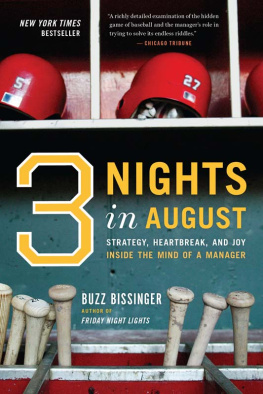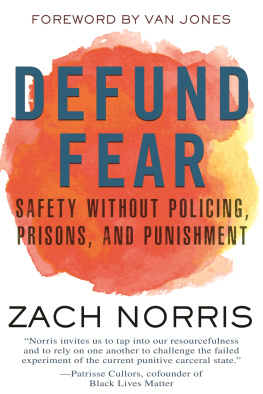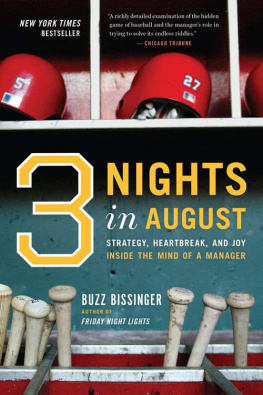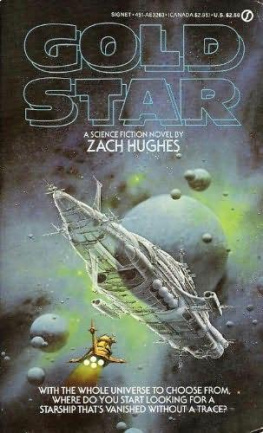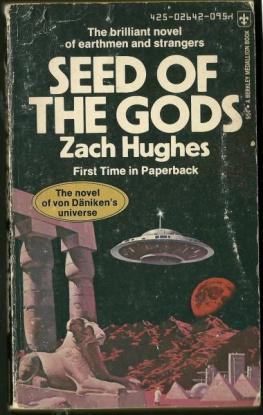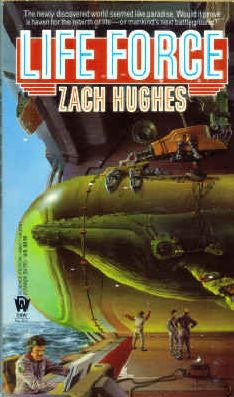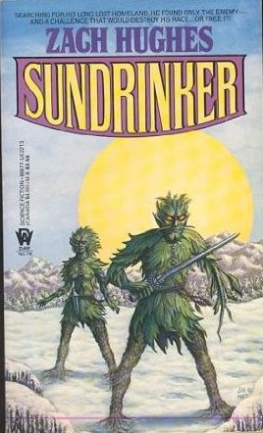Copyright 2012 by H. G. Bissinger
All rights reserved
For information about permission to reproduce selections from this book, write to Permissions, Houghton Mifflin Harcourt Publishing Company, 215 Park Avenue South, New York, New York 10003.
www.hmhbooks.com
The Library of Congress has cataloged the print version as follows:
Bissinger, H. G.
Fathers day: a journey into the mind and heart of my extraordinary son / Buzz Bissinger.
p. cm.
ISBN 978-0-547-81656-2
ISBN 978-0-544-00228-9 (pbk.)
1. Bissinger, H. G. 2. Bissinger, Zach, date. 3. Parents of exceptional childrenUnited StatesBiography. 4. People with mental disabilitiesUnited StatesBiography. 5. People with mental disabilitiesFamily relationshipsUnited States. 6. Fathers and sonsUnited StatesBiography. I. Title.
HQ 759.913. B 57 2012
306.874'2dc23 2012001360
Photographs by Robert L. Smith and Dominic Savini
e ISBN 978-0-547-81878-8
v3.0413
To Zach who trusted me with his life
To Gerry who helped me get through it
To Ari and Pete who knew I had to write it
To every parent who knows why
You should have died, Zach. Do you know that?
I didnt.
Authors Note
Fathers Day is a memoir, and parts of it must inevitably draw upon my memory alone. But I have tried as much as possible to base it on primary source material. All of my conversations with my son Zach during our road trip were taped; I transcribed the dialogue here verbatim. In order to capture the flow of his speech, in which he barely pauses for breath and merges each sentence or phrase immediately into the next, I present his statements without any punctuation.
In describing Zachs condition, education, and treatment, I relied on well over a thousand pages of medical and school records that I have collected since his birth.
In two chapters, I had to draw on sources other than my own records and memory. In Chapter 4, which deals with the history of premature infants, I relied on a variety of sources, including the following:
The Machine in the Nursery: Incubator Technology and the Origins of Newborn Intensive Care by Jeffrey Baker (Johns Hopkins University Press, 1996).
History and the Care and Feeding of the Premature Infant by Thomas Cone Jr. (Little Brown and Company, 1985).
A Patron of the Preemies by A. J. Liebling, The New Yorker (June 3, 1939).
When the Bough Breaks by Winifred Pinch (University Press of America, 2002).
Reflections on Errors in Neonatology, Parts 1, 2, 3 by Alex Robertson, Journal of Perinatology (2003).
Incubator-Baby Slide Shows by William Silverman, Pediatrics (August 1979).
American Characters: Martin Couney by Richard Snow, American Heritage (June/July 1981).
Baby Incubators, a Clinical Study of the Premature Infant, with Especial [sic] Reference to Incubator Institutions Conducted for Show Purposes by John Zahorsky (Nabu Public Domain Reprints, 1905).
2nd Son Born to Kennedys: Has Lung Illness, New York Times (August 8, 1963). Kennedy Infant Dies at Hospital, New York Times (August 9, 1963).
Official Guidebook (to the Chicago) Worlds Fair 1934.
In Chapter 5 on savantism, I used these sources:
On Some of the Mental Affections of Childhood and Youth: Being the Lettsomian Lectures Delivered Before the Medical Society of London in 1887, Together with Other Papers by J. Langdon Down (Nabu Public Domain Reprints, 1887).
Bright Splinters of the Mind by Beate Hermelin (Jessica Kingsley Publishers, 2001).
The Real Rain Man by Fran Peek (Harkness Publishing Consultants, 1996).
Prodigies by Oliver Sacks, The New Yorker (January 9, 1995).
The Man Who Mistook His Wife for a Hat by Oliver Sacks (Touchstone, 1985).
Mental Deficiency by A. F. Tredgold (Nabu Public Domain Reprints, 1915).
Extraordinary People by Darold Treffert (Ballantine Books, 1989).
Islands of Genius by Darold Treffert (Jessica Kingsley Publishers, 2010).
The Marvelous Musical Prodigy, Blind Tom, the Negro Pianist, Cornell University Library Digital Collections (circa 1867).
1
Zach
I
I AM MEETING ZACH AT Brooks Brothers in the sodden, sullen aftermath of Christmas. He has just come from work at the supermarket where he has bagged groceries for four hours with one fifteen-minute break. I cannot imagine my son doing such work at the age of twenty-four. It shames me to think of him placing sweat-drenched jugs of milk into their proper place and learning initially, with the extensive help of a job coach, that the eggs must be placed separately in double plastic bags. He has been doing the same job for four years, and he will do the same job for the rest of his life. My sons professional destiny is paper or plastic.
Except for brief lapses in which he pesters fellow employees like a seven-year-old, following them and calling out their names in a purposely aggravating singsong voice when they are trying to work, he does his job well. He limits his conversations with customers, although by nature he is ebullient and friendly. He no longer interjects his views, as he did several years ago when he was working at K-Mart one summer stocking supplies. When a customer asked where to find work gloves, he announced that he found it an odd request: What do you need gloves for? Its the summer. It defied his sense of logic; gloves are for cold, not hot, and Zach just wanted to make sure the customer understood the order of things.
He is well liked. Female cashiers call him my guy and my baby and treat him with protectiveness. He calls them by their first names, as if they all served in the trenches of World War I together. But he lacks the dexterity, or maybe the confidence, to handle a register or work the deli section. He fears change, because routine is the GPS that guides him. He orders the same entre virtually every time we go out for dinner: salmon. He occasionally ventures out into the uncharted territory of a Cajun chicken wrap or even a crab cake, but it is the pink flesh of salmon, even if it is more gray than pink and flaking off in dry chunks, that safely brings him home. He leans back in the La-Z-Boy I once gave him for his birthday and often watches the ten oclock news on Fox, not because he wants to keep up on current events, but because he takes comfort in seeing the usual television newsmakers like the mayor and the police chief and the indicted city official proclaiming innocence although the payoff money was found inside his pants. He also liked learning the names of the anchors and the weatherman. The world by its nature is chaotic and unpredictable, but Zach always narrows it down to a reliably straight line.
Because of trace brain damage at birth, his comprehension skills at the age of twenty-four are roughly those of an eight- or nine-year-old, although he is quite verbal. He can read, but he doesnt understand many of the sentences. He has basic math skills, although he is still prone to using his fingers. He understands money to a certain degree. Because his mother, Debra, and I encourage independence, he is allowed to use public transportation to go to Philadelphia where his other job is, stocking supplies at a law firm, and where his brother lives. The train stops at 8th Street and Market. He is supposed to walk the rest of the way if it is daylightabout seven blocks. But sometimes he sneaks in a cab ride. The fare is ten dollars. He dutifully pays the meter but then he leaves a five-dollar tip, making him a favorite among Philadelphia cabdrivers who otherwise drive in silent misery.
He cant add a hundred plus a hundred, although he does know the result is a lot, which is close enough when you think about it. He goes to movies, but the action and plot dont filter down to him; he seizes on images that he has seen before. I took him to see
Next page
